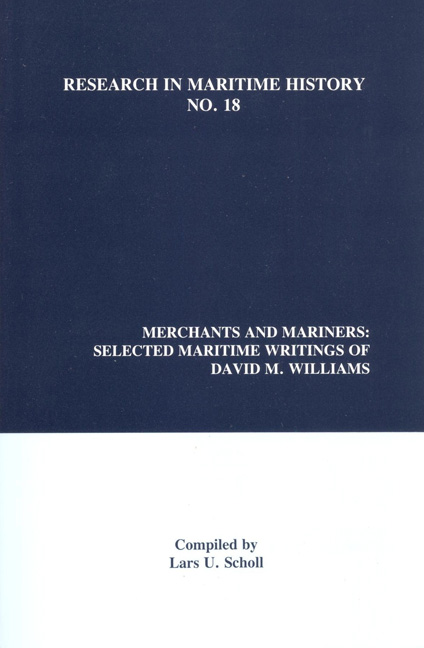Book contents
- Frontmatter
- Contents
- “Introduction”
- “David Malcolm Williams: A Tribute from an Old Friend”
- “David M. Williams and the Writing of Modern Maritime History”
- Writings
- “Abolition and the Re-Deployment of the Slave Fleet, 1807-1811”
- “Liverpool Merchants and the Cotton Trade 1820-1850”
- “The Shipping of the North Atlantic Cotton Trade in the Mid- Nineteenth Century”
- “Merchanting in the First Half of the Nineteenth Century: The Liverpool Timber Trade”
- “James Silk Buckingham: Sailor, Explorer and Maritime Reformer”
- “State Regulation of Merchant Shipping 1839-1914: The Bulk Carrying Trades”
- “Customs Evasion, Colonial Preference and the British Tariff, 1829- 1842”
- “Bulk Passenger Freight Trades, 1750-1870”
- “Henry Mayhew and the British Seaman”
- “Mid-Victorian Attitudes to Seamen and Maritime Reform: The Society for Improving the Condition of Merchant Seamen, 1867”
- '“Advance Notes' and the Recruitment of Maritime Labour in Britain in the Nineteenth Century”
- “The Quality, Skill and Supply of Maritime Labour: Causes of Concern in Britain, 1850-1914”
- “David M. Williams: A Bibliography”
“The Shipping of the North Atlantic Cotton Trade in the Mid- Nineteenth Century”
from Writings
- Frontmatter
- Contents
- “Introduction”
- “David Malcolm Williams: A Tribute from an Old Friend”
- “David M. Williams and the Writing of Modern Maritime History”
- Writings
- “Abolition and the Re-Deployment of the Slave Fleet, 1807-1811”
- “Liverpool Merchants and the Cotton Trade 1820-1850”
- “The Shipping of the North Atlantic Cotton Trade in the Mid- Nineteenth Century”
- “Merchanting in the First Half of the Nineteenth Century: The Liverpool Timber Trade”
- “James Silk Buckingham: Sailor, Explorer and Maritime Reformer”
- “State Regulation of Merchant Shipping 1839-1914: The Bulk Carrying Trades”
- “Customs Evasion, Colonial Preference and the British Tariff, 1829- 1842”
- “Bulk Passenger Freight Trades, 1750-1870”
- “Henry Mayhew and the British Seaman”
- “Mid-Victorian Attitudes to Seamen and Maritime Reform: The Society for Improving the Condition of Merchant Seamen, 1867”
- '“Advance Notes' and the Recruitment of Maritime Labour in Britain in the Nineteenth Century”
- “The Quality, Skill and Supply of Maritime Labour: Causes of Concern in Britain, 1850-1914”
- “David M. Williams: A Bibliography”
Summary
Professor Hobsbawm's famous comment that “whoever says Industrial Revolution says cotton,” might be taken a stage further to observe that whoever speaks of Britain's industrial greatness and domination of world trade in manufactures throughout the nineteenth century, speaks of cotton. Cotton was not merely the first industry to demonstrate the superiority of modern technology and large scale organisation, it remained Britain's chief manufacturing industry down to 1914 and cotton goods which supplanted woollens as Britain's leading export in the 1790s maintained their primacy for more than a century. Equally, to the United States, cotton was of crucial importance. It was the great staple of the South and after replacing tobacco as the country's principal export around 1815 it grew to account for well over half of United States’ exports in value terms by the mid-century. Understandably therefore cotton is possessed of a vast literature, studies of the extremes of plantation and factory are numerous and the commercial organization of the cotton market on both sides of the Atlantic has been the subject of detailed examination, interestingly as early as 1858 in the British case with Thomas Ellison's The Cotton Trade. Yet for all the attention lavished on cotton both by contemporary observers and subsequent historians, one element of cotton's spectacular nineteenth century expansion, namely the trade in raw cotton, has gone largely unconsidered. Of course the massive growth of British imports of cotton is well documented as is the development of a sophisticated market system associated with the introduction of the telegraph, but the actual transporting, the shipping of cotton across the Atlantic, has never been fully examined.
This neglect is all the more surprising when one views the quite incredible growth of the trade in raw cotton. In the forty years before 1860 imports of cotton into Britain increased almost tenfold. Liverpool was the chief port of receipt, accounting throughout the period for never less than eighty percent of Britain's annual imports. Within Liverpool's imports, cotton from the U.S.A. predominated. Table l6 which shows imports of cotton into Liverpool from the U.S.A. reveals the dramatic expansion which occurred.
- Type
- Chapter
- Information
- Merchants and MarinersSelected Maritime Writings Of David M. Williams, pp. 53 - 80Publisher: Liverpool University PressPrint publication year: 2000

